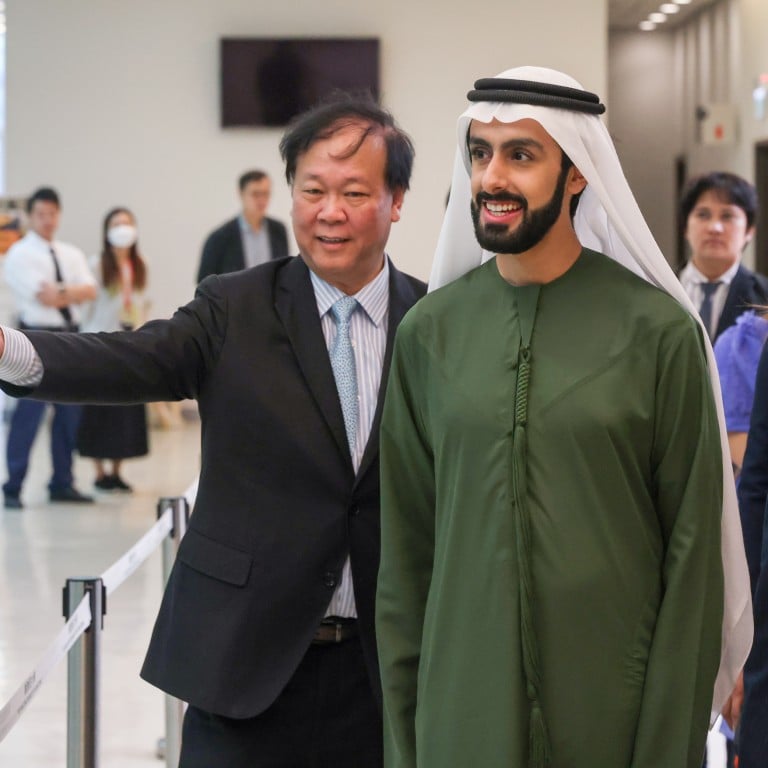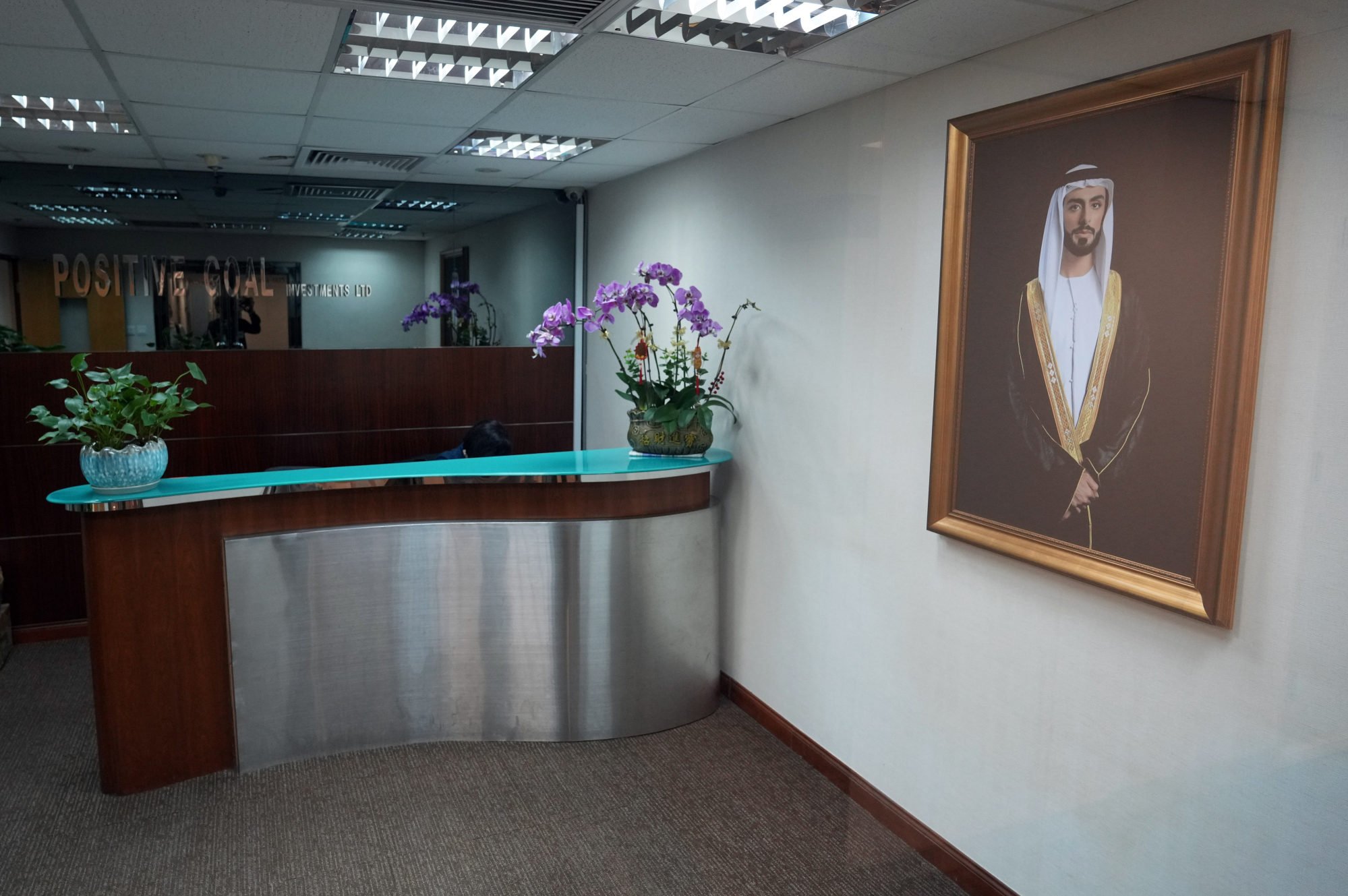
No due diligence done on Dubai’s Sheikh Ali Al Maktoum before he met Hong Kong’s John Lee and spoke at wealth summit
- Government official says no such protocol for routine courtesy meetings unless Chief Executive’s Office raised questions
- Cabinet adviser Ronny Tong says government should be more careful with early fanfare, after Dubai prince who pledged a US$500 million family office abruptly postpones its opening
Hong Kong authorities did not investigate the identity and financial background of a little-known Dubai prince who had pledged to set up a US$500 million family office locally before allowing him access to the city’s leader, the Post has learned.
They also did not subject him to any due diligence when they invited Sheikh Ali Rashed Ali Saeed Al Maktoum to a high-level summit as he had been recommended by businesspeople who had met him earlier in the United Arab Emirates (UAE).
“It was challenging to scrutinise each person individually,” a source familiar with the summit said.
Controversy surrounding the prince began when he was reported at first to be a nephew of Dubai’s ruler and prime minister of the UAE but later identified as a member of a distant branch of the ruler’s family.
As questions swirled over his identity, a government adviser urged the authorities to run background checks on such guests before trumpeting them to “avoid egg on the face”.

During Maktoum’s recent stay in Hong Kong last week, he was received by city leader John Lee Ka-chiu on Tuesday as part of a group, and spoke at the high-end summit for prominent investors and global family office industry professionals on Wednesday.
The high-profile visit of the 28-year-old prince came under the spotlight after he abruptly postponed the inauguration ceremony of his family office meant to be held the next day on Thursday, citing “urgent matters in Dubai”.
Amid reports of his close aides’ questionable track records, his office said on Friday he would return to formally open the office at the end of May.
Speaking on condition of anonymity, a government official explained that for routine courtesy meetings with the city’s leader, there was no established protocol for conducting background checks on guests unless the Chief Executive’s Office had questions about their identity.
The official recounted that on Tuesday afternoon, Maktoum was escorted to meet Lee, along with other prominent business figures, without any prior checks. He added that his colleagues were well aware of the prince’s US$500 million investment commitment in Hong Kong.
The Post learned the government went ahead with the meeting on the basis of the prince’s announcement of his plan to invest and that he was confirmed to be royalty.
Similarly, there was also no due diligence done when he was invited to speak at the Wealth for Good in Hong Kong Summit, organised by the Financial Services and the Treasury Bureau in collaboration with InvestHK, a government department responsible for foreign direct investment.
UAE prince’s Hong Kong family office shares space with casino-linked firm
The source familiar with the matter told the Post that government staff did not conduct due diligence on the identity, background and financial credentials of some 500 guests invited to the event, including Maktoum.
“The primary objective was to discuss business opportunities in Hong Kong and encourage them to engage in business activities here,” the person said.
He added Maktoum was seen by staff from InvestHK on the ground in Dubai as “an active businessman”. The government employees were convinced that he was indeed a “sheikh”, a title designating a person as a royal family member of the UAE.
Professionals who handle due diligence issues regularly pointed out while specialised agents could be engaged for more thorough checks, vetting a seminar speaker was not a common practice and information about a Middle Eastern royal could be hard to uncover.
The private office’s website, which was created less than a year ago based on domain name registration records, offers scant information about the prince’s past business record.
Dubai prince abruptly postpones opening US$500 million Hong Kong family office
Barrister Ronny Tong Ka-wah, a member of the key decision-making Executive Council, said while due diligence would be unnecessary to merely offer tax breaks for eligible family offices, he felt the hype was “merely due to the government wanting some publicity on this”.
“I suggest when [the government] does intend to make use of a case for publicity, it should conduct an in-depth investigation to make sure there will not be an issue in terms of a backfire,” the senior counsel said.
“Before any fanfare is trumpeted, perhaps some background checking is needed so as to avoid egg on the face.”
But solicitor and former accountancy sector lawmaker Kenneth Leung Kai-cheong said it was not a common practice for seminar organisers to vet speakers as they were supposed to be well-known figures from large organisations and listed companies. The risks would also be relatively low.
“Once the talking is done, the two sides wouldn’t be in any substantial relationship with no conflicts of interest. One wouldn’t make too many extra steps to verify a speaker,” he said.
Hong Kong’s family office hub drive augurs well for private banking: Citigroup
However, he agreed a certain level of checking should be conducted on those invited to meet the city leader in light of the reputational risks. In such situations, the government could engage outside consultancies, some of which specialise in due diligence focusing on Middle East individuals and entities.
The Post reported that the lack of public information about Maktoum’s source of wealth had caused concern among potential business partners.
But a lawyer who has worked with Middle Eastern clients said the lack of information about the prince was “not too surprising”.
“There’s often very little information available about the source of wealth of Middle Eastern royals, aside from their representation that it’s family wealth – which is usually seen as enough of an explanation by most bankers and wealth managers who take their money for management,” said the lawyer who asked not to be named due to the sensitivity of the matter.
“The one thing that should be checked is that he is indeed a prince, and to try and identify the basis for his claim to royalty – again information that can be hard to uncover, and of course to be done discreetly so as not to offend the prince.”
The consulate of the UAE in Hong Kong earlier confirmed that Maktoum was “from the ruling family”, while two sources with knowledge of the royals said Maktoum was from a “distant branch” of the ruling family.
Gary Ng Cheuk-yan, senior economist at Natixis Corporate and Investment Bank, acknowledged the government’s difficulties in vetting all 500 guests attending a high-level summit.
But he argued that improving due diligence was important, especially as the government was eager to expand into new markets with very different cultures and business norms.
“If Hong Kong wants to attract family offices, it can create favourable policies and promote overseas. There is no need for a big [public relations] show to showcase one single deal. If the money comes, it comes,” he said.
“The drama can be avoided if the government focuses more on laying foundations than desperately showing how much it has achieved.”

